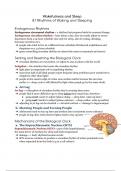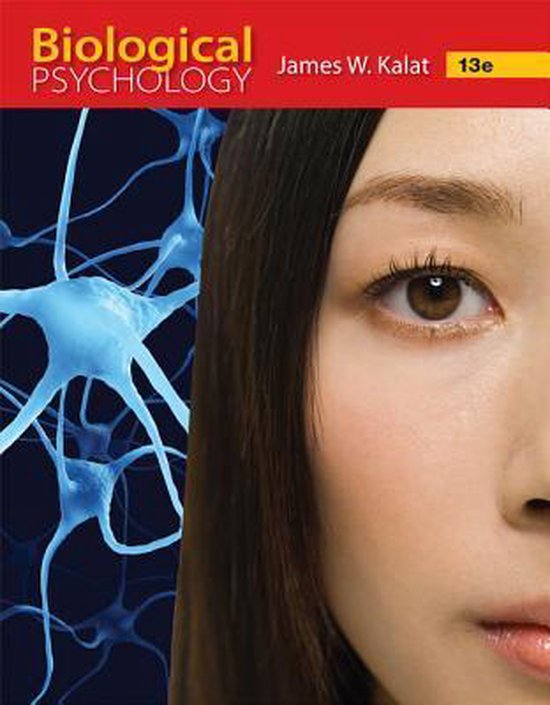Wakefulness and Sleep
8.1 Rhythms of Waking and Sleeping
Endogenous Rhythms
Endogenous circannual rhythm = a rhythm that prepares birds for seasonal change
Endogenous circadian rhythm = lasts about a day, does not easily adjust to severe
departures from a 24-hour schedule (not only for sleep, also for eating, drinking,
hormone secretion etc.)
➔ people who tried to live in a different hour-schedule still showed wakefulness and
sleepiness on a 24-hour schedule
➔ genes controlling circadian rhythm are almost the same in mammals and insects
Setting and Resetting the Biological Clock
➔ circadian rhythms are not perfect, we adjust to stay in phase with the world
Zeitgeber = the stimulus that resets the circadian rhythm
➔ light plays an important role in regulating rhythm
➔ more than half of all blind people report frequent sleep problems (poor sensitivity to
zeitgebers other than light)
➔ people at the eastern edge of a time zone awaken earlier because the sun rises
earlier (=> sleep cycle is still affected by light when people go by the same clock)
a. Jet Lag
Jet lag = a disruption of circadian rhythm due to crossing time zones
➔ people find it more difficult to go to sleep before their usual time, therefore:
● going west: easier to adjust (phase-delay → sleep later, wake up later)
● going east: harder to adjust (phase-advance → sleep earlier, wake up earlier)
➔ adjusting to jet lag can be stressful => elevated cortisol => damage to hippocampus
b. Morning People and Evening People
➔ adolescents tend to stay up later and awaken later (consistent across cultures)
➔ people in big cities (with electric lights) tend to stay up later
Mechanisms of the Biological Clock
a. The Suprachiasmatic Nucleus (SCN)
Suprachiasmatic Nucleus (SCN) = part of the hypothalamus,
the main driver of rhythms for sleep and body temperature
➔ damage => body rhythms become erratic
➔ SCN neurons continue to produce a circadian rhythm of action potentials even
when separated from the body (e.g in a cell culture)






